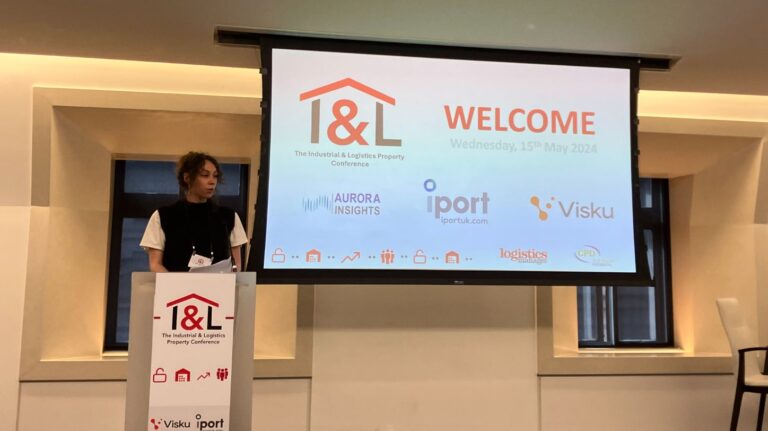This morning [15 May], doors opened at 30 Euston Square as the 2024 edition of Logistics Manager’s Industrial & Logistics Property Conference got underway.
This annual conference allows attending industrial and logistics property occupiers to learn about how they can leverage their properties to help with their business, operational, environmental, social and governance strategies.
Before delving into some of the incredible insights shared by expert speakers, Logistics Manager would like to thank the sponsors of this event: Visku, iPort UK and Aurora Insights.
The morning began with Logistics Manager’s editor Emily Uwemedimo making her opening remarks. Welcoming the delegates, Uwemedimo touched on the value of resilience and adaptability in today’s property sector, particularly when it comes to commercial property.
She went on to address sustainability and urban logistics as two trending topics which are becoming increasingly spoken about in boardrooms across the UK, before kicking the conference off by introducing the first speaker.
The first session of the day was delivered by Gareth Hughes, business services and ESG director at Whistl. In his presentation, entitled ‘Delivering on ESG – From the boardroom to operations’, Hughes covered the company’s 2045 net zero target and the progress it has made towards its sustainability goals in the past year. This progress included the adoption of electric vans, which now comprise 10% of Whistl’s fleet of vans.
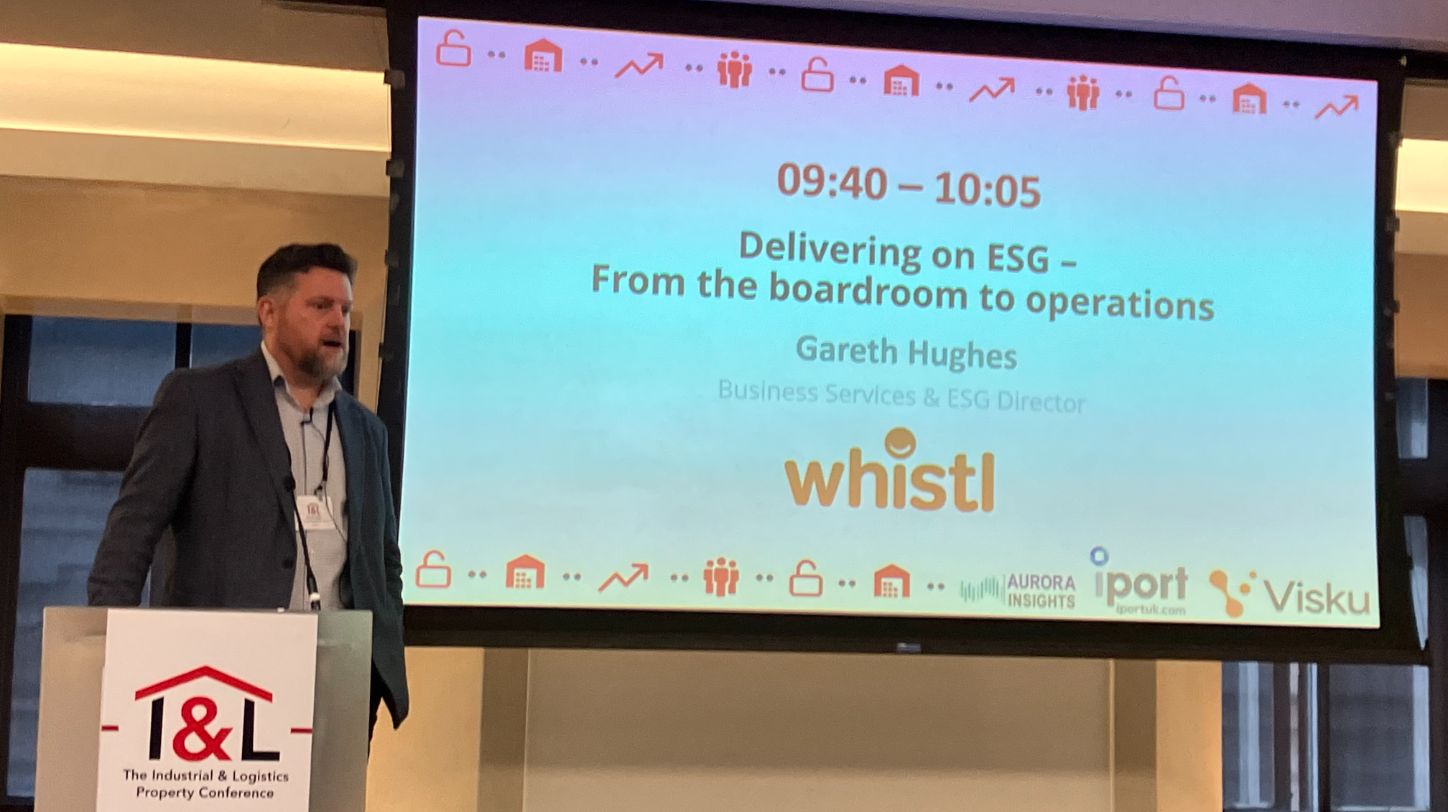
From a property perspective, Hughes outlined Whistl’s plan to use 100% renewable electricity across all sites by the end of 2025 as a means of reaching its net zero 2045 target. He also highlighted the need for supplier engagement, as well as training and communication, in order for companies like Whistl to meet their sustainability targets.
Hughes spoke about the importance of understanding a customer’s goals, focusing on their pathway and sticking to it; he said: “What our customers do influences what we do” and “shapes what we do, how we do it and what we prioritise”.
He alluded to issues surrounding ESG and CSR in the past, when it was often viewed as a “dark art” which wasn’t fully appreciated by those in boardrooms. He explained how this view can be changed through demonstrating its business advantages, so ESG can be seen more as a benefit than a burden.
In response to a question from the audience about Whistl’s own sustainability pathway, Hughes noted that it’s better to be “credible and cautious” than to be “showboating and falling at the first hurdle”.
Next onto the stage was Tim Jones, director of marketing, communications and sustainability at DPD. His session, entitled ‘More sustainable delivery from DPD’, covered DPD’s adoption of electric vehicles (EVs), alternative fuels, renewable energy and last-mile delivery robots.
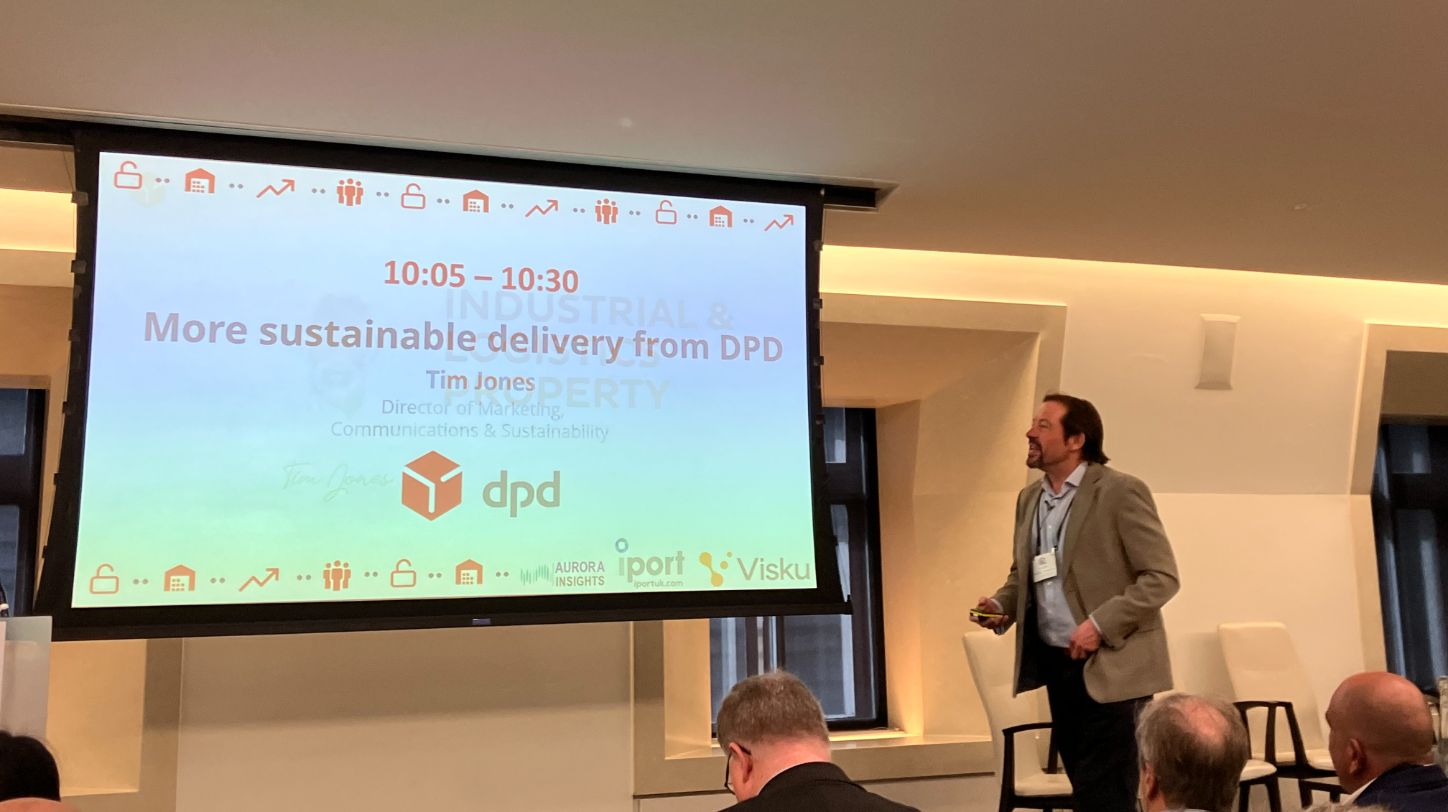
He explained: “We want to be the UK’s leader in sustainable delivery”. This objective, Jones said, was driven by consumer feedback for the delivery of their goods to be more sustainable.
Plus, Jones gave an insight into DPD’s “biggest ever depot”, a diesel-free Docklands site which regularly processes 80,000 parcels. The facility features 20 twin 50kW charging points in order to support the use of 500 EVs, 1.2MW solar panels and furniture made from recycled or sustainable sources.
He gave an insight into the difficulty of dealing with “red tape”, when it comes to planning, saying that in the case of the Docklands site, DPD ran into “planning issue after planning issue” and a project that was due to take eight months ended up taking around two years.
Jones also spoke about DPD’s Hinckley site, which uses 100% renewable energy, either purchased or generated.
Finally, he touched on the use of AI, which he said “doesn’t replace people” but noted that “what it’s brilliant at is crunching data” and “helping us predict volumes”.
The next session came from Andy Kaye, founder and director of Visku – one of the conference’s sponsors. In Kaye’s session, entitled ‘Re-thinking warehousing for flexibility and sustainability’, he shared what Visku’s customers had identified as the biggest challenges when it comes to property, from pressure on operating costs to reducing carbon footprint.
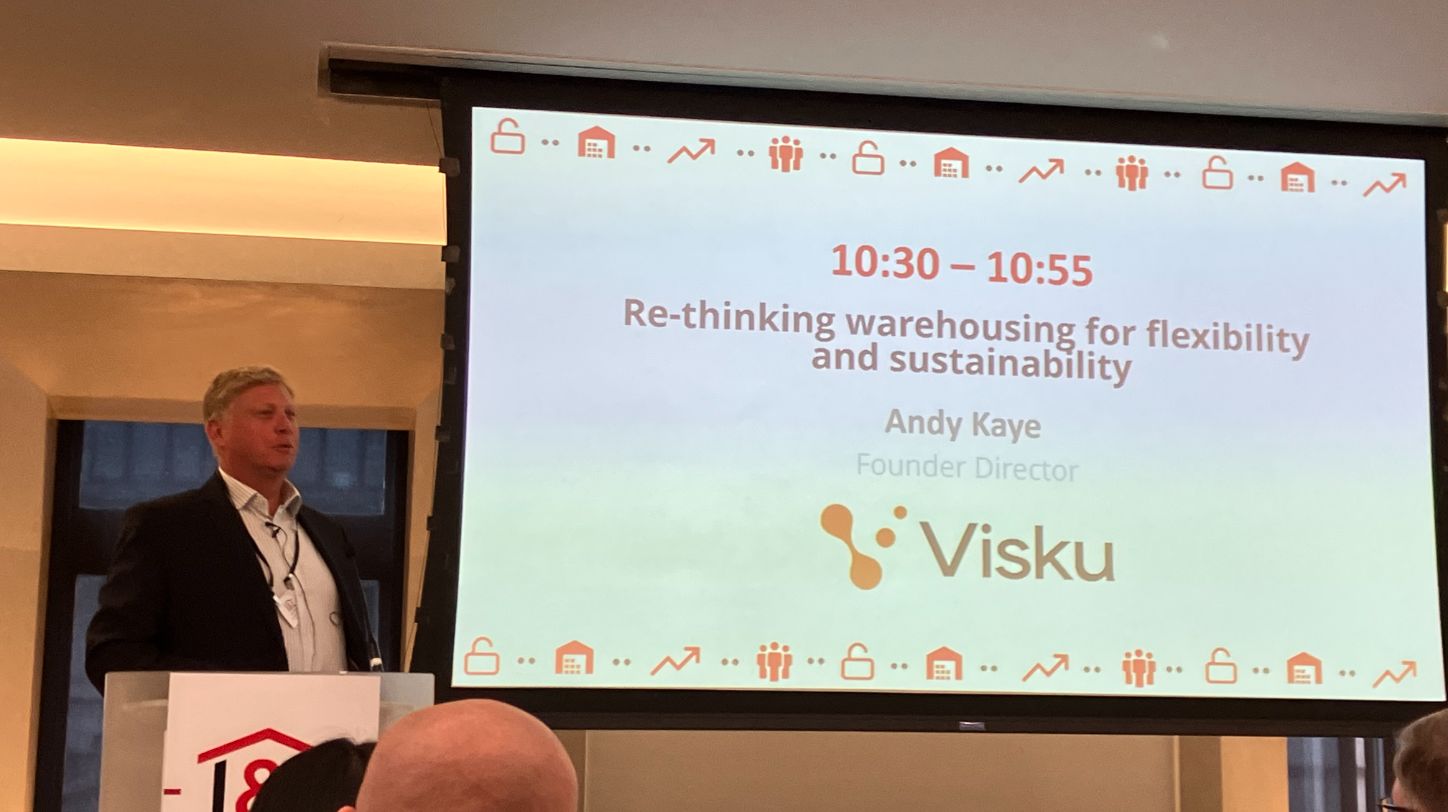
According to Kaye, the four key factors that property occupiers are concerned with today are “agility, affordability, flexibility and sustainability”.
He explained his view that flexibility is the key to addressing industry issues, moving away from traditional ownership and long-term leasing models to a pay-as-you-need model. Through Visku’s “Pallet Hotel” model – as well as its partner network, digital platform and expert advice – Kaye believes that the company can solve many of the issues that modern logistics companies are facing in the property market.
He acknowledged that building more warehouses is not the most sustainable way to increase capacity in the UK, and that many of the current facilities will soon no longer be fit-for-purpose to due to increasingly stringent sustainability regulations.
After a short break, Simon Cordery, senior property and commercial manager at Places for London, gave his presentation, entitled ‘Places for London’s EV charging hubs joint venture – partnering with the EV industry to deliver market-leading charging infrastructure’.
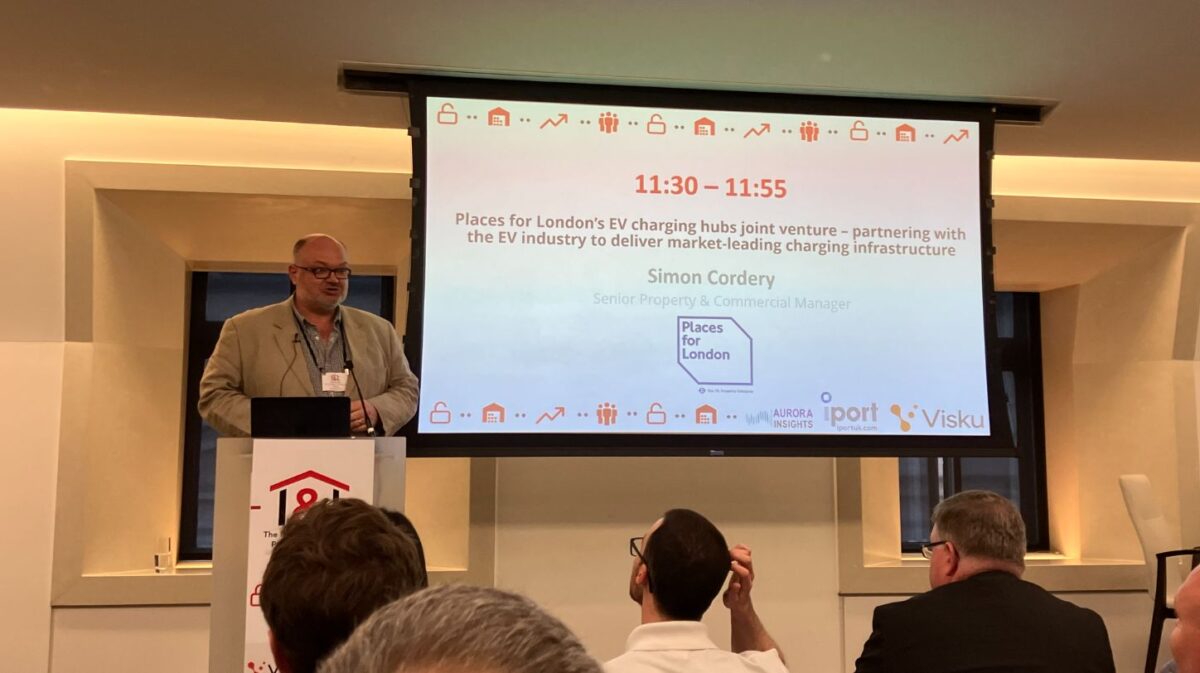
He spoke about Places for London’s project delivering a substantial portfolio of ultra-rapid charging hubs across Greater London, considering the implications of the project and what it means for London’s EV industry, as well as what’s next going forward.
Cordery explained the decision to deliver the project as a joint venture rather than through concessions, from the perspective of flexibility and being able to keep up with an ever-changing market. “We can change the technology as [the optimal form of] technology changes,” he added.
Up next was Peter Smith, managing director of Vision Logistics with his session entitled ‘The impact of evolving healthcare logistics requirements on UK infrastructure’. This touched on the evolution of the healthcare sector on the final-mile delivery requirements and how the emphasis on a robust infrastructure will enable an enhanced experience for patients.
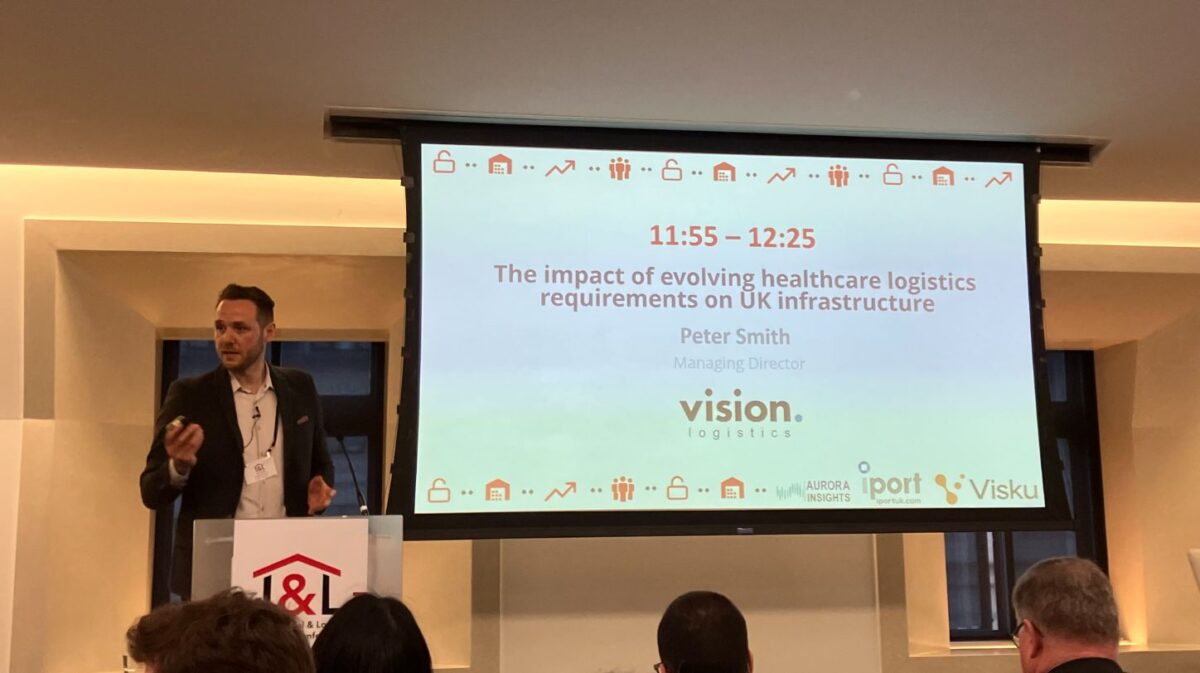
He explained how healthcare logistics can differ from other sectors, for example through allowing longer times for deliveries to give patients the opportunity to interact and socialise with the delivery driver, as well as how the industry is impacted by economic factors such as the NHS budget deficit. When it comes to healthcare delivery, Smith emphasises that “the patient experience becomes paramount”.
He acknowledged that logistics providers are “a fundamental part” of the NHS solution. “We have to offer a sustainable healthcare logistics solution [with] the greatest patient experience possible,” Smith asserted.
He mentioned not only urban logistics, but the need for infrastructure to be in place to offer healthcare logistics services to patients in rural areas.
Then, in the final session before lunch, Rich Pleeth, co-founder and CEO of Fin Sustainable Logistics, delivered his presentation, entitled ‘Micro-hubs and sustainable logistics’. He spoke about how micro-hubs can be used to decarbonise logistics in the final mile through the use of EVs and e-cargo bikes.
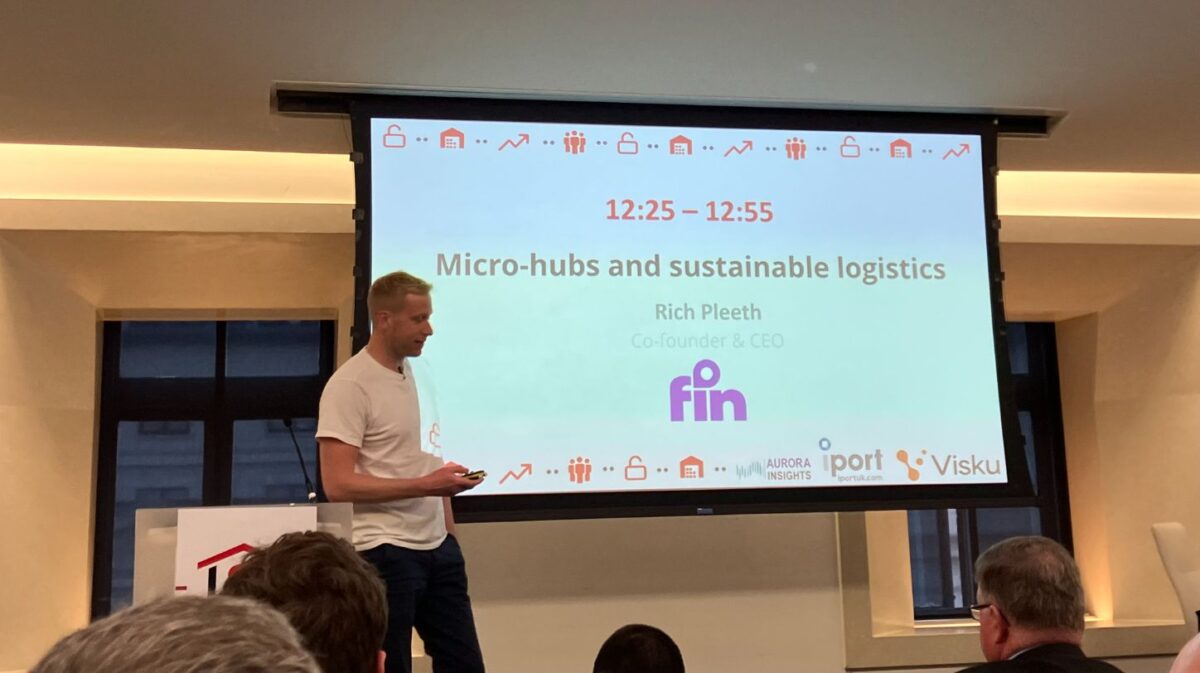
He acknowledged the challenge of finding suitable urban locations for micro-hubs that make financial sense, as well as challenges arising from political pressure, such as the ULEZ, congestion charges and the upcoming general election.
Pleeth spoke about the rise of ultra-fast urban deliveries using micro-fulfilment hubs and his view that this business model isn’t sustainable in the long term.
He identified a major problem, saying that “parcel delivery in our cities is outdated and deliveries are increasing”. He went on to note that “consumers are increasingly demanding eco-friendly delivery” but acknowledged that an issue arises when it comes to who is willing to bare the burden of the increased cost of more sustainable logistics.
Pleeth was keen to emphasise the need for collaboration to improve micro-fulfilment, sharing his vision for a future that would see “consolidated deliveries and shared micro-hubs”. This collaboration, he says, would need to be between the logistics industry, internally, and also externally with local boroughs.
That’s all for this morning. Keep an eye out this afternoon for highlights from the rest of the conference.


